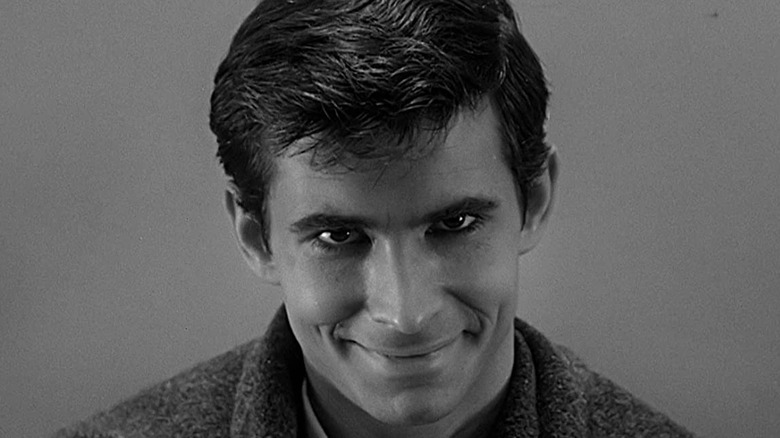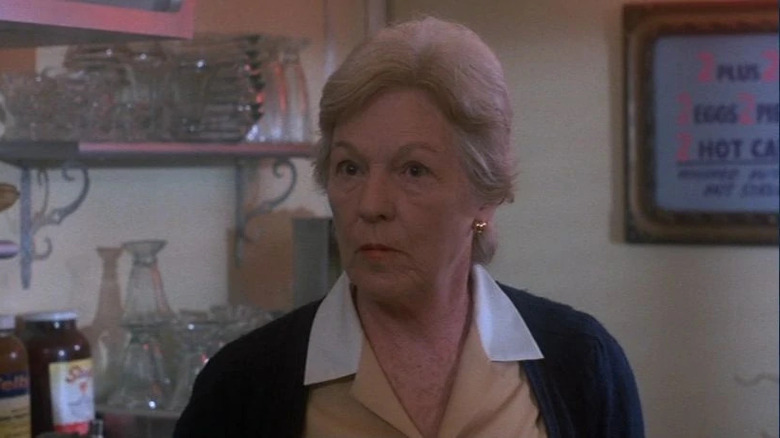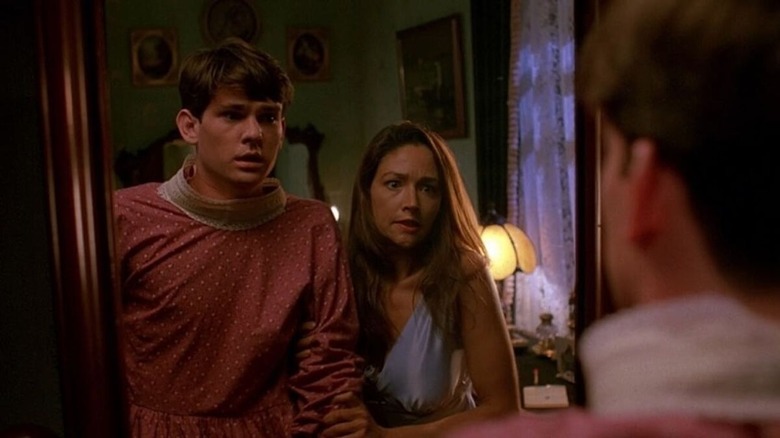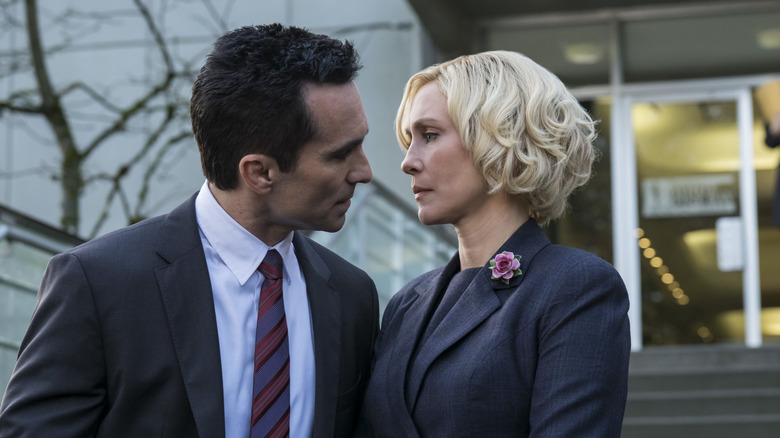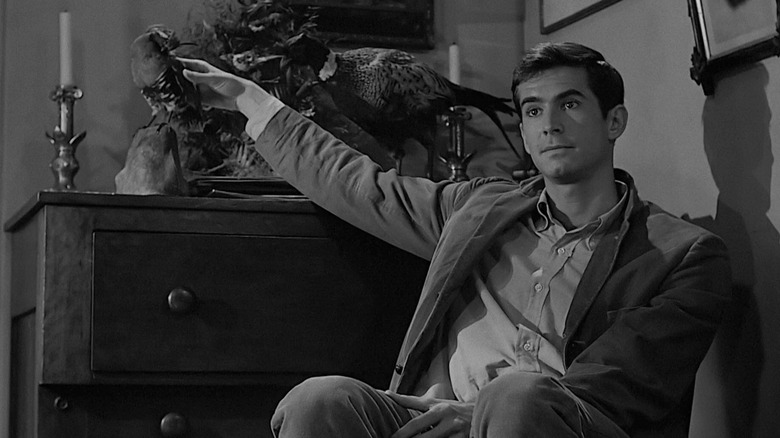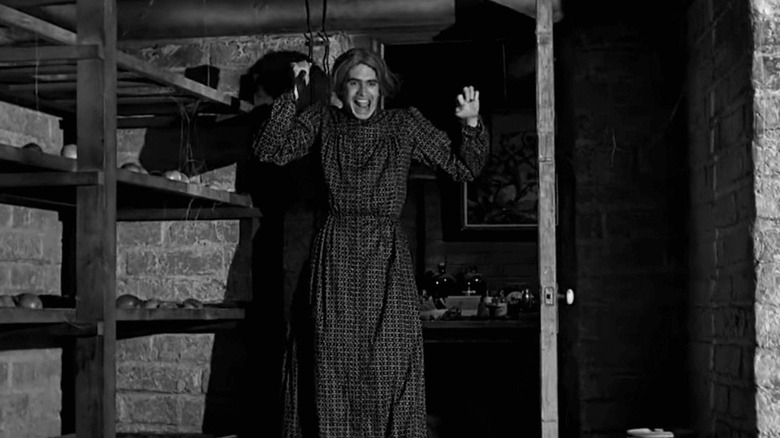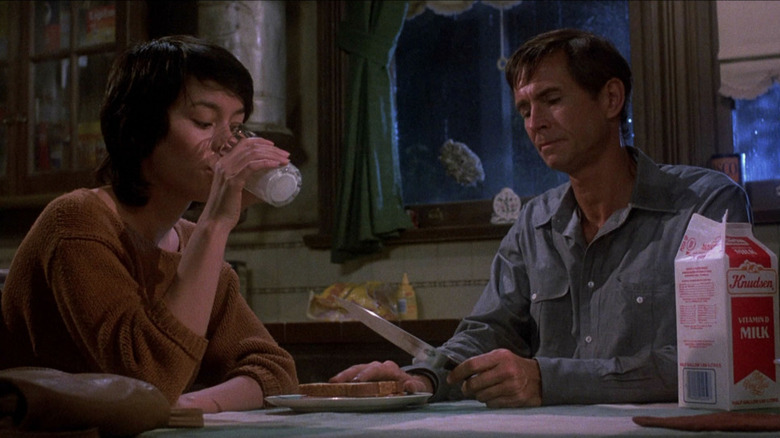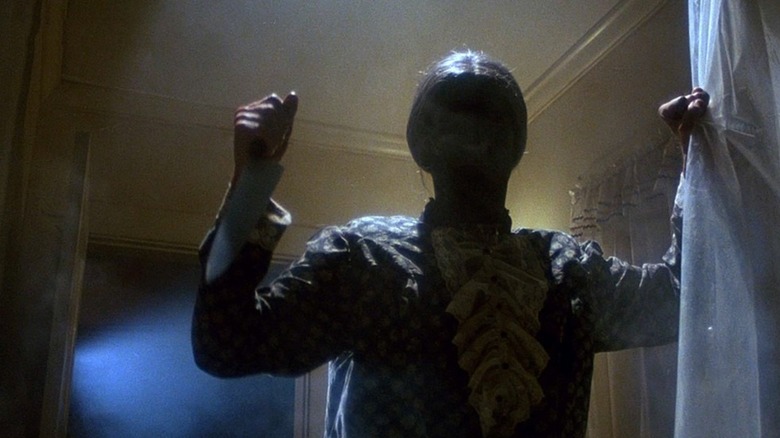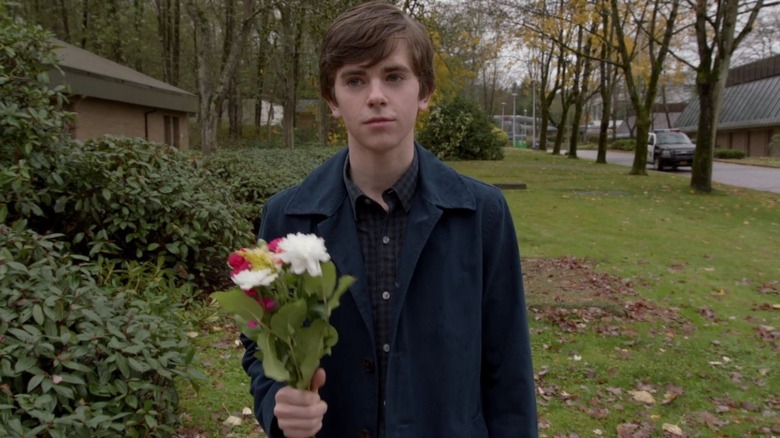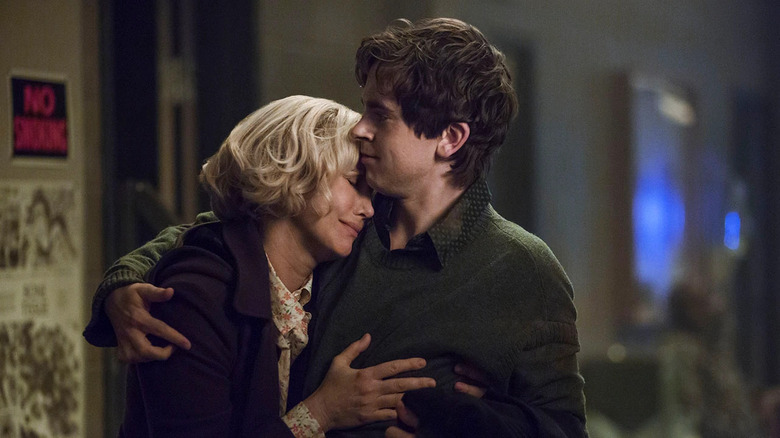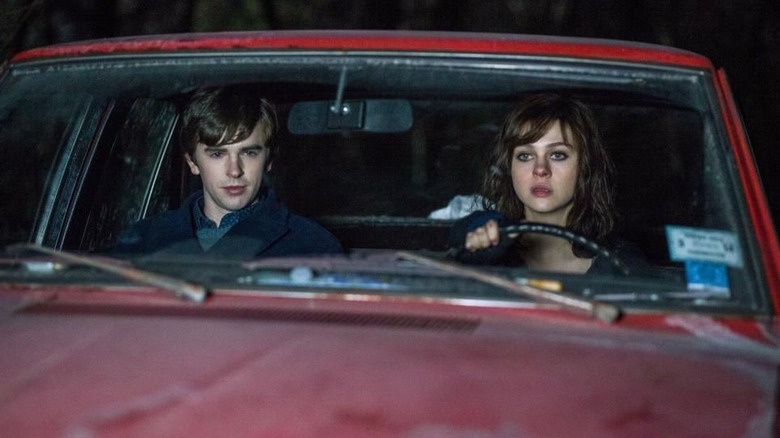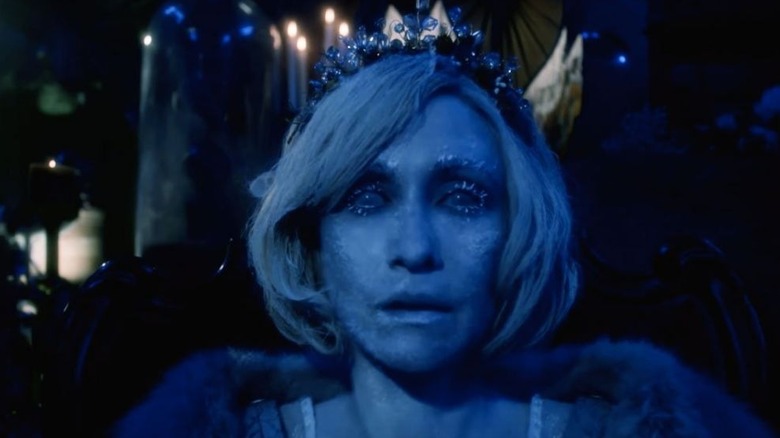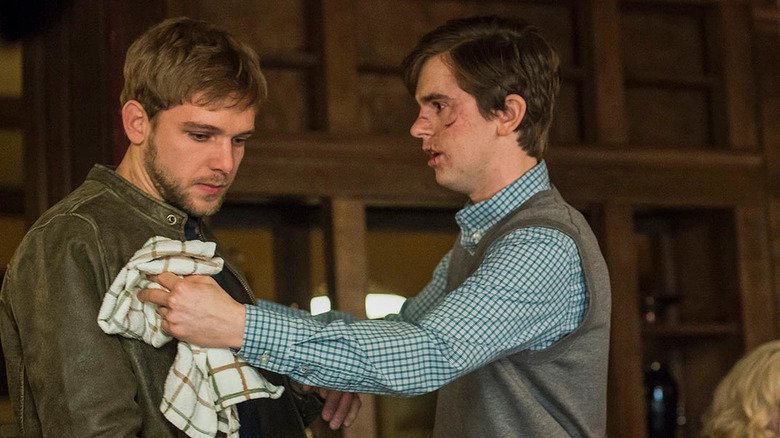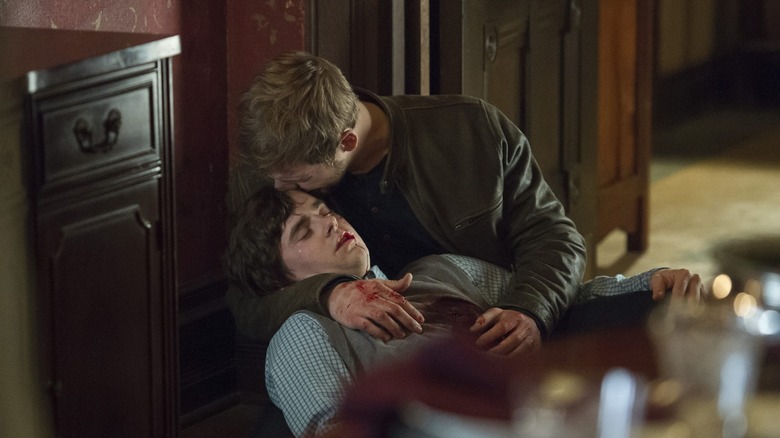The Dark History Of Psycho's Norman Bates
In the history of horror, few villains have stood the test of time like Norman Bates, the protagonist of the "Psycho" films and "Bates Motel" television series. Though the details of his background and upbringing have changed over time, one thing remains true: He is a serial killer who takes on the persona of his long-dead mother, Norma Bates.
When Norman first graced the silver screen in Alfred Hitchcock's 1960 thriller "Psycho," he immediately became terrifying because of how normal and relatable he appeared. He ran the Bates Motel and was a seemingly harmless guy living alone on a big property. His two-story Second Empire home and the motel have become iconic parts of cinema history, just as recognizable as Norman himself.
The history of Norman is a long and complicated one, and both Anthony Perkins' portrayal of him in the film series and Freddie Highmore's in the prequel are captivating renditions of a dynamic protagonist and villain. Inspired by the crimes of Ed Gein, author Robert Bloch created Norman for his 1959 novel "Psycho," which would quickly be adapted into the legendary film less than a year later. Bloch's version of Norman differs from the character becomes in the movies, but that is a crowning testimony to the wide-ranging foundations of Bloch's initial vision. Read on to discover the dark origins of Norman Bates in the world of "Psycho" and "Bates Motel."
The following article mentions instances of violence and sexual assault.
Norman was kidnapped by his aunt as an infant
For all intents and purposes, "Psycho" was a perfect horror movie that needed no sequels. But that's never stopped a studio before. Set 22 years after the first film, "Psycho II" follows Norman after his release from an institution, and is unrelated to Bloch's "Psycho II" novel.
The biggest twist of that film comes at its end, when Emma Spool (Claudia Bryar), an elderly waitress at the diner Norman works at, reveals that she is his real mother, that Norma was her sister, and that she was the one committing the murders over the course of the film. The psychological climax reveals that Norman was adopted by Norma when Emma was institutionalized, further complicating Norman's own psyche. In response, Norman kills Emma and begins talking like "Mother" again.
One month after the events of "Psycho II," Norman is running the Bates Motel while the corpse of Emma is sitting in the house. "Psycho III" is a standard horror flick that tries to gnaw at Norman's largely unknown backstory. He falls in love with a suicidal nun, hires a scummy musician to run the motel, and begins murdering young college kids.
But most of the plot surrounds Tracy Venable (Roberta Maxwell), a Los Angeles journalist working on an article about serial killers who were released from prison or psychiatric institutions. Believing that Norman is on a murder spree, she begins researching him and learns that Emma was in love with Norman's father, killed him out of revenge for marrying Norma Bates, and kidnapped Norman when he was an infant.
His mother was abusive after his father's death
In 1990, Mick Garris and Joseph Stefano created a made-for-television film, "Psycho IV: The Beginning." It was meant to pick up the pieces of Norman's childhood and what made him become a serial killer. The events depicted in "Psycho IV" would end up contrasting heavily with those in "Bates Motel" 20 years later, but we learn that Norma (Olivia Hussey) was abusive to Norman (Henry Thomas) when he was a child, especially in the immediate aftermath of his father's death.
Using flashbacks set in the 1940s and 1950s, we see Norma beat Norman over nothing, toss him out in the rain while naked, and dress him up in women's clothing, among other things. It's implied that Norma was mentally ill, and Norman is depicted as a sweet kid driven to madness by his own mother. Norma and Norman live in total isolation until she begins dating a man named Chet (Thomas Schuster), who ruthlessly bullies Norman.
In the most haunting flashback, which takes place at Norman's father's funeral, we see Norma tickling her son during the service and, when he giggles out loud, she reprimands him in front of everyone. "Psycho" had no intention of provoking empathy for Norman's character, but its sequels were always up to the task of shining a light on what made him a monster.
If you or someone you know may be the victim of child abuse, please contact the Childhelp National Child Abuse Hotline at 1-800-4-A-Child (1-800-422-4453) or contact their live chat services.
Whenever his mother dated someone, Norman felt abandoned
Norma's relationship with Chet was, in the film series' canon, what finally drove Norman to kill his mother. His jealousy made him resent her to the point of murder, and, once he did kill her, he was wracked with guilt over what he'd done — this led to him dressing and speaking like her around the house when no one else was around. Before Chet, Norma wasn't often intimate, which added to Norman's inability to cope with the idea of her making room in her life for someone else.
But in "Bates Motel," Norma (Vera Farmiga) has numerous boyfriends, all of whom are met by a despondent and jealous Norman (Freddie Highmore). He doesn't kill any of them himself, but his reactions to their presence do turn Norma away from romance often. In the Bates family canon, especially in the prequel series, Norma's overprotection of Norman makes him ultra-dependent on her in his day-to-day life. When he senses her straying away, he grows cold and dejected, believing she is on the fast path to abandoning him.
Norman murdered his mother
Most audiences know about the end twist of "Psycho," that Norman killed Norma and dressed like her as he carried out his murders. The way in which he did it was also revealed at the end of the first film, that he poisoned Norma and her boyfriend in bed. "Psycho II" and "Psycho IV" would elaborate on those events further, that he poisoned a pitcher of lemonade, but the murder of Norma remains a central plot point in the "Psycho" canon.
When "Bates Motel" aired in 2013, there was a lingering question of how, and when, Norman would murder his mother. It was expected to be the conclusion of the series in season five, but, in an unforeseen twist during the penultimate episode of Season 4, Norman attempts to commit murder-suicide by closing all of the heating vents in the house and dying in bed with his mother from carbon monoxide poisoning. When Norma's husband, Sheriff Romero (Nestor Carbonell), returns to the house, he is unable to save Norma. Norman, however, survives and is immediately blamed by Romero.
The depiction of Norma's death in "Psycho IV" was a standard portrayal of a story we already knew, but "Bates Motel" defied audiences' expectations by making death a wanted solution for Norman, who could feel his mother's love slipping away after she married Romero.
Norman would dress up as his mother
The origins of Norman dressing up as Norma have changed over time. In "Psycho IV," it's revealed that Norma would punish Norman by making him dress up in women's clothing, or smear lipstick across his face. There's a clear link in the film series to Norman's adolescent trauma, though it is also inferred that dressing like his mother is a coping mechanism for him when he battles through the grief and guilt of killing her.
In "Bates Motel," however, the idea of Norman dressing like Norma is more centralized on his desire to keep her spirit alive after death. But even then, before Norma's death, Norman's brother Dylan (Max Theriot) catches him dressed like their mother after she's left the house to go to a bar. Norman's psyche in "Bates Motel" is much more complex, and the series attempts to decode it. In the prequel, it's an early chapter in his journey through a murderous psychosis. In the films, it's a central component of the aftermath of his mother's murder.
Norman's split personality was provoked by Marion Crane's sister
After spending 22 years in prison, Norman is finally released and allowed to return to normal life. Weirdly, he is sent back to the home he grew up in, where all of the murders took place. He almost immediately begins seeing visions of his mother in her bedroom window and is sent notes from her — or so he believes. Now a free man, Norman is set up with a diner job down the road from the motel, where he meets Mary Loomis (Meg Tilly), who happens to be the daughter of Lila Loomis (Vera Miles) and the niece of Marion Crane (Janet Leigh).
Mary, through the encouragement of Lila, becomes a guest in Norman's house after proclaiming that she's having a spat with her boyfriend. Together, Mary and Lila are the ones leaving notes for Norman, calling his home phone, and posing as his mother in the window. Subsequently, murders happen on the property, which, as we come to discover later on, are carried out by Emma Spool, not Lila and Mary.
It's impossible to say whether or not Norman would have begun hearing voices or impersonating his mother again if Mary and Lila hadn't provoked him. Lila, seeking revenge and retribution for her sister's murder, hopes to frame Norman for the murderer he is, but ends up meeting her demise at the hands of Emma. The mother and daughter's goal is met, as Norman is back to his old ways by the end of "Psycho II."
Norman experienced blackouts when he killed
In "Psycho," we learn that Norman has no recollection of the murders he commits, as he is fully imprisoned in his "Mother" persona during the acts. In the "Bates Motel" prequel series, the writers explore his condition even more. We learn that Norman has grappled with dissociative states and recurring blackouts since he was a boy. When he murders his father, he has no memory of it for years after it happened.
Norma becomes worried about her son's blackouts, especially when he dissociates after the murder of Keith Summers (W. Earl Brown) and the showdown between Dylan and Zack Shelby (Mike Vogel), the latter of which left Norman seriously wounded and in shock. His blackouts prevent him from getting a driver's license and, out of fear authorities will discover the true reason for Norman's father's death, Norma refuses to allow him to see a psychologist. Her unwillingness to get her son help quickly becomes unmanageable, and leads to her own demise.
Norman successfully ran the Bates Motel for years before getting caught
Though Norman's time running the motel alone after Norma's death in "Bates Motel" barely amounts to a year, in "Psycho IV," it's revealed that a great number of years passed between Norma's death and Norman's eventual capture. After staging his mother's and her boyfriend's deaths as a murder-suicide, Norman is mostly able to function and run the motel by keeping up the facade that she is alive and confined to her bedroom.
As a young kid, many years before the events of "Psycho" take place, we see the inner workings of Norman's day-to-day life at the motel. On the Fourth of July, Holly (Sharen Camille), a local girl who has a crush on Norman, stops by the Bates' property and flirts with him. When Holly, against Norman's wishes, goes up into the house, she tries seducing him before he ultimately kills her while dressed as Norma. The time that passes between "Psycho II" and "Psycho III" is only a month, but we can see how Norman is prepared to resume his pre-"Psycho" life, alone.
In the prequel series, the cause for Norman's fractured psyche is fully revealed
"Psycho IV" presents Norman's fractured psyche as the result of years of belittlement, bullying, and physical and emotional abuse from Norma. Her cruelty drives him to the brink, and she and her boyfriend Chet ultimately pay the price for it. But in "Bates Motel," the writers handle it a lot differently. Across the series, there are numerous flashbacks to Norman's childhood, including many instances where his father was abusive toward him and Norma.
In one of the most heartbreaking scenes of the series, Norman, while a patient in an institution, reveals as "Mother" that he was hiding under his parents' bed when his father raped Norma. Though he was only a young boy, and most likely didn't understand the exact abuse occurring above him, Norman held Norma's hand through the attack, as his mother was his greatest love, and it's a surrendering moment of trauma and pain that most certainly informed Norman's mental health for the rest of his life.
If you or anyone you know has been a victim of sexual assault, help is available. Visit the Rape, Abuse & Incest National Network website or contact RAINN's National Helpline at 1-800-656-HOPE (4673).
Norman helps his friend fake her death, only to murder her later
A major plot point in Season 1 of "Bates Motel" is Norman's relationship with Bradley Martin (Nicola Peltz), a popular girl at school with whom he's infatuated with. After Bradley's father dies in a warehouse fire, Norman attempts to comfort her. In a moment of vulnerability, they sleep together and Norman becomes even more obsessed with her.
In Season 2, Bradley kills Gil (Vincent Gale) because he murdered her father. Norman, and eventually Dylan, aid her in an escape by staging her suicide. When Bradley returns at the end of Season 3, she discovers that her family has moved on from her "death" and, in turn, wants Norman to run away with her. Having already lost a part of himself to his "Mother" persona, Norman kills Bradley in the woods near the motel, losing one of his dearest friends in the process.
Norman keeps his mother's corpse in the house
Much of the lore of "Psycho" is rooted in the fact that Norman dug up his mother's corpse, preserved it like a taxidermied animal, and hid it in various parts of the Bates house. In the famous finale of the first movie, it's revealed that Norman had been keeping Norma's body in the fruit cellar, as he sensed that the authorities were planning to stop by his property.
In "Bates Motel," Norman elects to make a shrine for his mother's corpse in the basement where he performs his taxidermy. The shrine is eventually discovered by Norma's brother Caleb (Kenny Johnson), who comes to the house because he believed Norman was violent and might hurt his sister. "Bates Motel" opts to focus more on Norman's hallucinations of Norma, rather than where her body is kept in the house. Doing so leaves the legacy of Norma's body sitting beside her bedroom window in the "Psycho" film series untouched, and perfectly establishes contrasting themes in each iteration of Norman's character.
His brother Dylan tried to save Norman from their mother's manipulative ways
In Season 1, after moving back in with Norma and Norman, Dylan sees just how toxic and manipulative Norma is with his brother, and decides to do what he can to protect him. In turn, Dylan borrows $5,000 from Ethan (Terry Chen), his work partner, and plans to buy a place big enough for him and Norman to live in. Dylan's plan fails, however, as Norma intervenes and refuses to let Norman go with him.
Throughout the series, Dylan wants to protect Norman, as he believes it is Norma who is pushing him to the brink. But, after the murder of Zack Shelby, Norma informs Dylan that Norman killed his dad. He realizes that he won't be able to protect Norman as he initially thought. Though Dylan wasn't entirely wrong about Norma's effect on Norman, he couldn't bring himself to fully interfere and get Norman the help he needed.
In the prequel, Norman spares Marion Crane's life and confesses to his murders
When Marion Crane (Rihanna) arrives in Season 5 of "Bates Motel," audiences expect to see a modern-day depiction of Crane's tragic murder, a death that terrified moviegoers in 1960. However, like Norma's death, the "Bates Motel" writers rewrote the original film's continuity. Marion, who is having an affair with Sam Loomis (Austin Nichols), arrives at the motel and is told by Norman, who has become infatuated with Sam's wife Madeleine (Isabelle McNally), that he is married. When Marion berates Sam, she returns to the motel and is consoled by Norman, who advises her to leave the area. He spares her life, and the plot of "Psycho" is abandoned.
When Norman kills Sam, he attempts to cover it up, but eventually confesses, and is formally charged with it and the murder of two other people. This storyline contrasts with that of "Psycho," which details Norman not getting charged with any murders until he is caught at the end of the first film. The writers of "Bates Motel" notoriously did not stick to the "Psycho" continuity, instead opting to create their own world and write an ending that better suited the complicated life and psyche of Norman Bates.
Dylan murders Norman after a disturbing dinner party
In the finale of "Bates Motel," only Norman and Dylan (and Emma, in another state) are alive and tasked with having one final "showdown" together. After Norman murders Romero, his hallucination of Norma tells him that she has nothing left to protect him from and vanishes. In a dissociative state, Norman recreates scenes from the show's first episode, digs up Norma's corpse, and invites Dylan over for dinner.
Little does Dylan know, however, that his mother's corpse is awaiting him at the Bates house. When Norman is unable to face the reality of his mother's death, he concludes that he's unable to live without her and attacks Dylan, who fatally shoots him. Norman dies in Dylan's arms and thanks his brother for allowing him to reunite with their mother in death. It's an emotional end to Norman's trauma-filled life, one that allows Dylan to live his life with Emma (Olivia Cooke) and their child in peace.
